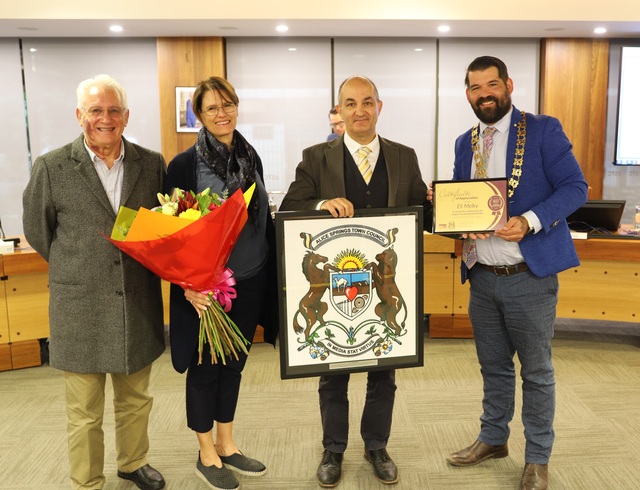The 1 May Competing Fairly Forum was welcomed by the participants at over 60 venues across the nation. The audiences, ranging from less than 10 to 100, took advantage of a satellite hook up to learn the meaning of unconscionable conduct and how to combat it.
Economic Development Manager at Burnie Council, Lionel Young, rated the Forum 10 out of 10. Mr Young, the Burnie Forum convenor, said the introductory video was brilliant and set the scene for an excellent program that delivered a clear message.
He said it was a pity that the Forum was not telecast nationally by the ABC.
Burnie Council is keen to support the next Forum.
While the Forum initiator was the Australian Competition and Consumer Commission, a lot of the credit must go to Local Government. In many towns, Mayors, Councillors and staff were prominent in the lead up to 1 May acting as local convenors and encouraging small business and community interest. They, along with parliamentarians and other prominent citizens, were among the participants.
Local Government has taken a keen interest in the Forum concept beginning with the pilot program held late last year. Local Government Focus publicised the 1 May Forum and featured articles on the rights of small businesses under the Trade Practices Act.
Small business is a major employer in many towns across the nation and their economic lifeline. When small business operators are confronted by an over aggressive franchisor, landlord or supplier they may be confused about their rights and where to seek help.
The 1 May Forum was about unconscionable conduct as some rural and regional businesses have been a victim of it. It is more than driving a hard bargain: it is exploiting a stronger bargaining position to force unreasonable conditions on the small partner. This can make life very difficult, resulting in personal anguish and heavy financial losses.
Unconscionable conduct can often occur when contracts are up for renewal with unreasonably harsh conditions laid down on a take it or leave it basis.
The Forum began with a video on the meaning of unconscionable conduct, how to combat it and how to seek help if necessary. This was followed by the introduction of an expert panel, headed by the ACCC Chairman, Professor Allan Fels. The panel answered questions asked by business operators, including farmers.
The questions came from all points of the Australian compass: from Darwin to Burnie and Albany to Griffith. Topics included retail leases, the demands of franchisors, bank risk margins on loans and the concerns of fruit and vegetable growers.
In addition, almost 30 questions were taken live in a special offstage call centre. Those that could not be responded to on the night are being followed up by the ACCC that will be getting back to the individual questioners with written responses.
The major message from the panel to those fearing they might be victims of unconscionable conduct was the importance of keeping records of contract details, of conversations with the stronger partner, of payments and of any new demands.
This is vital if small business are to protect themselves and if professional organisations, such as the Australian Retailers Association, the Australian Farmers Federation or the Franchise Council of Australia are to be of help. If you seek the assistance of the ACCC it has to be convinced you have a strong case in seeking contract changes or compensation.
Professor Fels and ACCC Commissioner, Sitesh Bhojani, stressed that the main goal was to settle problems between parties without recourse to the courts. But court action, in particular, required good records.
The ACCC has won significant cases against companies engaged in unconscionable conduct. A notable one was the recent Federal Court decision awarding $82,000 to three franchisees of the Cheap As Chips group for unconscionable conduct that included terminating a franchise over a payment dispute and threatening to terminate franchises rather than negotiate over money owed.
The aim of the 1 May Forum was to let small business operators know what constitutes unconscionable conduct and that they are not alone if they are confronted by it. The Federal Minister for Small Business, Ian Macfarlane, told the audience that small business needed this form of legislative support.
The Trade Practices Act, and the ACCC that administers it, he said, are sending a clear message to big and small business about their rights and responsibilities.
The Shadow Minister for Small Business, Joel Fitzgibbon, also emphasised the importance of the role being played by the Trade Practices Act and the ACCC for regional Australia.
Professor Fels said that the ACCC’s education program, that includes visits to many parts of regional Australia to talk to business and discuss the Act, was changing attitudes with big business becoming more careful in their dealings with smaller partners.The Competing Fairly Forums are a key element of the information and education program.







